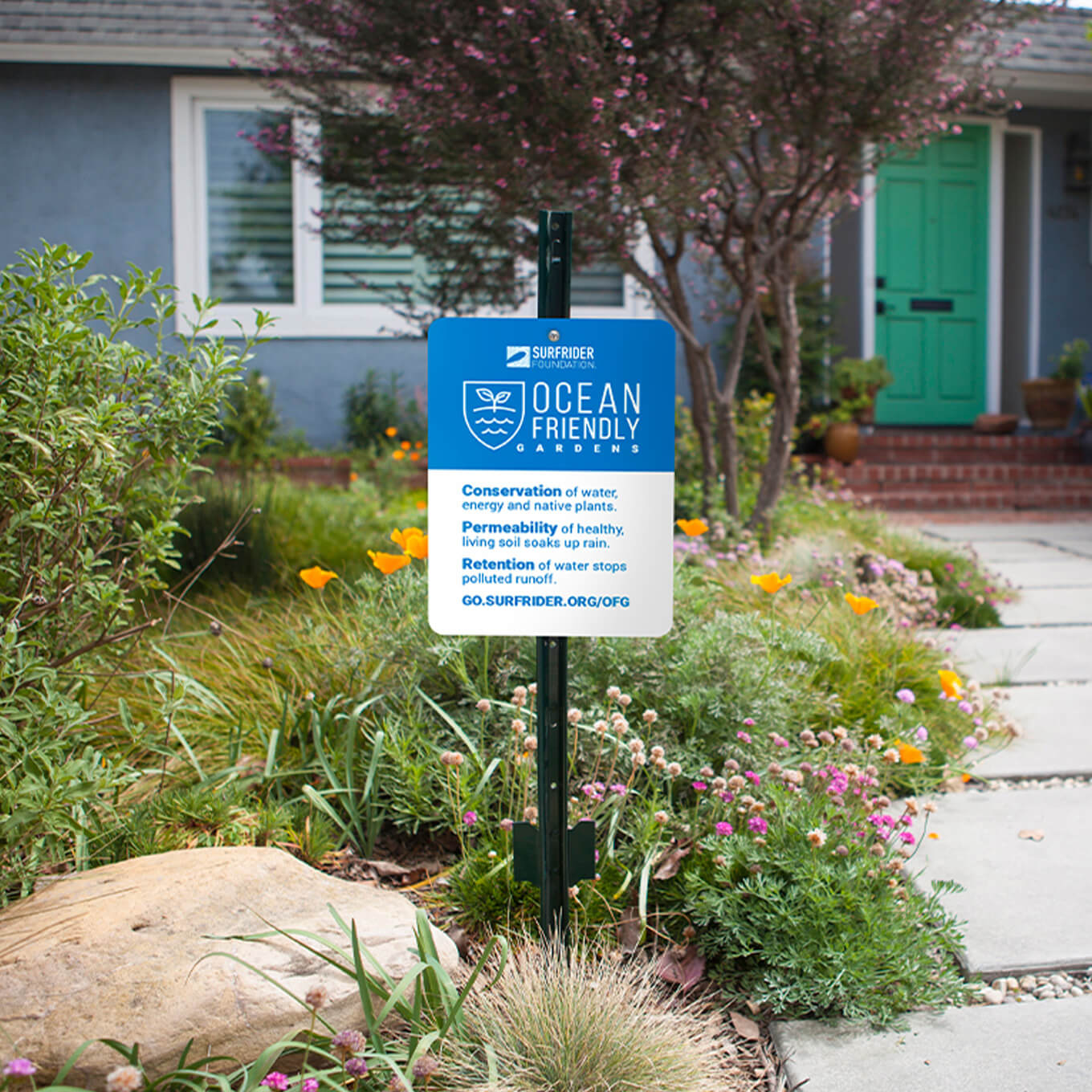Want to make your yard more sustainable? From skipping chemical pesticides to planting native species, small changes in your yard can make a big impact downstream.
Get started with our free, easy-to-use guide to help you plan a yard and garden that’s beautiful, low-maintenance, and ocean-friendly.
Did you know that a flourishing garden can also help protect our ocean, waves, and beaches? From skipping toxic pesticides to planting native species, small changes in your yard can make a big impact.
- Ocean Friendly Gardens can naturally filter and utilize the rainwater that lands on your property, reducing your water bill while protecting clean water at the coast.
- Native plants within Ocean Friendly Gardens create wildlife habitat and support critically needed biodiversity within our urban and suburban areas.
- Ocean Friendly Gardens support climate resiliency by sequestering carbon in healthy soils, reducing emissions from gas powered maintenance tools, and offsetting urban heat island effects.
Want to make your garden Ocean Friendly? We created a free, easy-to-use guide to help you plan a yard that’s beautiful, low-maintenance and can help protect clean water downstream.
Fill out the form to download the Surfrider Foundation's Ocean Friendly Gardens guide today!
Download Your Free Ocean Friendly Gardens Guide Today!
Surfrider’s Ocean Friendly Gardens (OFG) program offers simple and beautiful nature-based solutions to protect clean water and support resilient coasts and communities. OFGs restore the natural functions of healthy watersheds by contouring landscapes for rainwater retention, directing water back into the ground instead of storm drains. The extensive root systems of native plants help naturally filter pollutants and sponge up extra water while restoring biodiversity to our urban landscapes.
By returning nature to our urban spaces, OFGs support climate resiliency goals by sequestering carbon, reducing air and water pollution, and avoiding climate emissions from energy-intensive maintenance practices. OFGs provide an opportunity to build equitable access to nature within neighborhoods and communities that lack green space while empowering volunteers with the skills to grow a more resilient future.
For more information or questions:
Kathryn Dressendorfer, Southern California Ocean Friendly Gardens Coordinator
kdressendorfer@surfrider.org
Surfrider chapters use OFGs to build awareness of the connection between how we care for our yards and public spaces and the resulting health and resilience of our local waterways and beaches.
OFGs can be anywhere, whether you live inland or at the beach. Any yard, park, or community green space can help protect clean water by using the watershed approach to reduce pollution that harms our waterways and coasts.
OFGs work as green infrastructure to better prepare our communities for storm events, reducing local flooding and preventing runoff from overwhelming storm drain and sewer systems. Rainwater is directed back into the soil to naturally filter pollutants and recharge groundwater supplies.

10 trillion gallons of untreated stormwater runoff flow into U.S. waterways every year





Does your yard or community space meet our Ocean Friendly Gardens standards? If all criteria are met, you can be an ambassador for ocean-friendly gardening with an OFG yard sign and a spot on our OFG map.
Plants: support wildlife & resilient habitat
- Native plants cover at least 50% of garden or yard
- Turf grass kept to a minimum in appropriate climates and maintained sustainably
- All plants are climate-appropriate (rainfall keeps them healthy when established) or edible
- No invasive plants
Healthy, Living Soil: sponge up water & filter pollutants
- No use of pesticides, herbicides, or fungicides
- No commercial fertilizers. Compost, worm castings, or homemade organic solutions are applied if fertilizer is needed
- No landscape fabric (weed cloth) or artificial turf
- Natural mulch used as needed around plants to conserve water, rebuild soil health, and suppress weeds
Water & Irrigation: conserve water & avoid wasteful runoff
- Hand watering or high-efficiency irrigation system (drip, rotator sprinkler)
- Automatic irrigation controller (if present) has a rain shut-off device
Redirect & Soak Up Rain: prevent runoff & stormwater pollution
- Simple contours such as bio-swales, dry creeks, and basins are used to maximize rainwater retention and prevent runoff
- Rainwater from the roof is directed to landscaping, a permeable area or into rain barrels and cisterns that overflow onto permeable areas
- Existing walkways and patios direct rainwater runoff to landscaping where possible
- Pavers with gaps or permeable materials used for new hardscapes
Our national Ocean Friendly Gardens map showcases yards, community gardens, and volunteer-led OFG projects across Surfrider. Does your yard or garden meet our OFG criteria? Reach out to kdressendorfer@surfrider.org to get registered to the map & help inspire others to take action!
.jpg?width=1620&height=1080&name=IMG_8808%20(1).jpg)
- OFG Criteria (en Español)
- To order an Ocean Friendly Garden Sign, please email Kathryn Dressendorfer, kdressendorfer@surfrider.org
- Beachapedia Article: OFGs & Guidance for Fire Hazard Zones
- Learn more about pollution in your watershed
- Discover the importance of Healthy Soil
- Comparison of Resources used in OFG vs. Traditional Landscape
- California Watershed Approach to Landscape Design Handbook
- Make a DIY Compost Worm Bin
- Reroute your downspout to prevent stormwater pollution
- Learn about rain gardens
- Volunteer with your local Surfrider chapter
Join our network and help us tackle the issues that face our ocean, waves and beaches.
Support Surfrider and our network of coastal defenders.
Take action right from your computer by contacting your local officials.